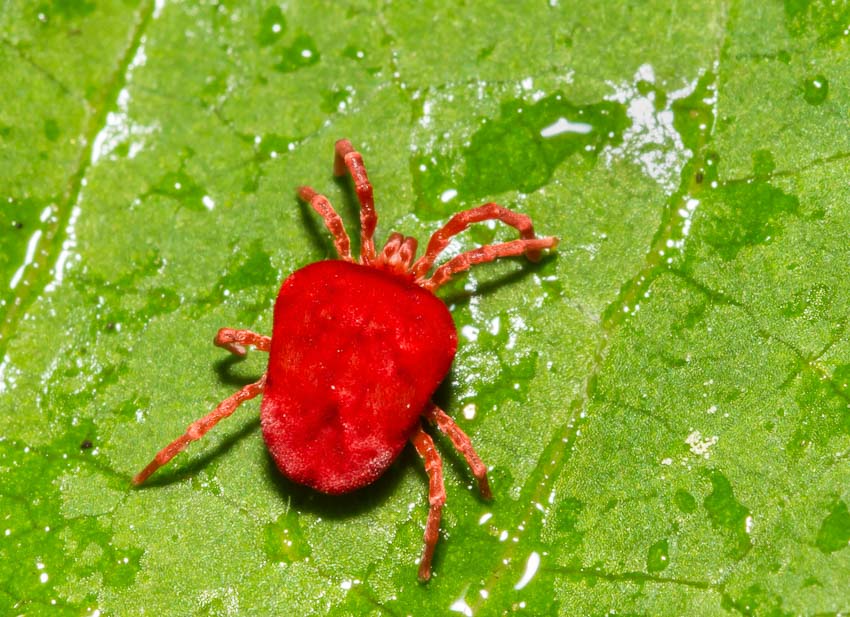Chiggers have a reputation as bad as fleas and ticks, and for good reason. These tiny creatures are ectoparasites that bite humans and animals, causing great discomfort. This guide will give you everything you need to know about how to get rid of chiggers, how to spot them, and where you can find them.
What are Chiggers?
Chiggers are tiny arachnids, a close relative of spiders and ticks. Technically, they are a species of mites from the Trombiculid family, and they feed on terrestrial vertebrates, including humans and their pets.
You’ll often find chiggers in lawns and tall grass during the summer months. It’s the larval form of chiggers that get on your skin and cause itching and inflammation, known as trombiculosis.
Characteristics and Lifecycle
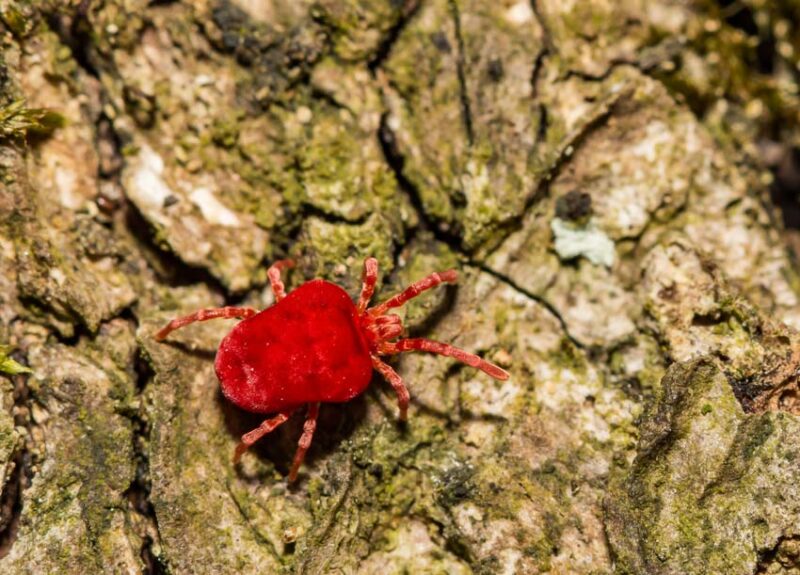
Learn more about the lifecycle of chiggers and how to identify them.
Appearance, size, and lifecycle stages
Larval chiggers are about the size of a grain of sand, and you may not even notice them until your ankles and feet start itching. Under a microscope, they look like tiny fleas or ticks. As larvae, they are yellow or orange, and as adults, they are bright red.
Chiggers undergo complete metamorphosis with four distinct lifecycle stages, including egg, larva, nymph, and adult. The adults spend the winter in unremoved leaf litter and other protected sites, laying eggs in the spring.
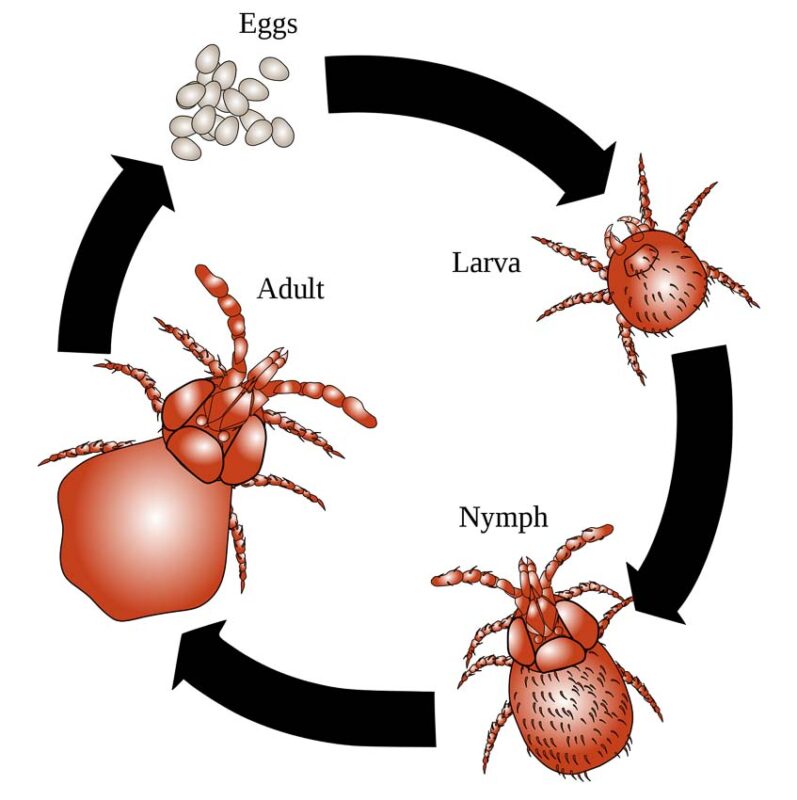
Once the eggs hatch, the parasitic larval stage begins, where they attach themselves to their hosts. They pass through two nymphal stages before becoming adults and repeat the lifecycle.
Adult female chiggers live about one year, producing multiple generations of chiggers. They complete the entire lifecycle in 40 to 70 days, with up to four generations per year.
Common misconceptions about chiggers
The biggest misconception about chiggers is that they burrow into your skin and feed on your blood. Thankfully, that’s not the case, but the reality isn’t much better.
Chigger larvae climb to the tips of plants, where they can crawl onto passing vertebrate hosts. Then, they attach to the skin, often around your ankles or where the skin is tender, such as the backs of knees or armpits.
Chiggers are so tiny that when they bite you, you won’t even feel it, but their saliva contains a digestive enzyme that breaks down the cells in your skin. The enzyme turns your skin cells into a liquid that the chigger can absorb, and this process causes red bumps on your skin that can itch for weeks.
Where Do Chiggers Live in Nature?
While you can find them throughout the world, chiggers are most common in the midwestern, southwestern, and southeastern United States. Learn about their preferred environments, habitats, and seasonal variations in chigger populations.
Preferred environments and habitats
Chiggers frequently live in grassy areas like your lawn, but they also inhabit wooded spots near water and brushy and weedy areas. They require both moisture and shade to survive.
While chiggers are active from spring to fall, they are most noticeable in early summer, when the larvae feed. The lush vegetation at this time of year provides the perfect habitat for them.
How to Get Rid of Chiggers
Learn how to get rid of chiggers naturally and keep them from infesting your home, yard, and pets.
Removing Chiggers from Your Yard Naturally
Although you’ll see chiggers in the southern and midwestern United States, distribution is spotty. It’s possible to make your yard less inviting to chiggers to get rid of them naturally.
Beneficial plants that deter chiggers
Several insect-repelling plants will deter chiggers, including catnip, lavender, marigolds, and basil.
Diatomaceous earth and other natural repellents
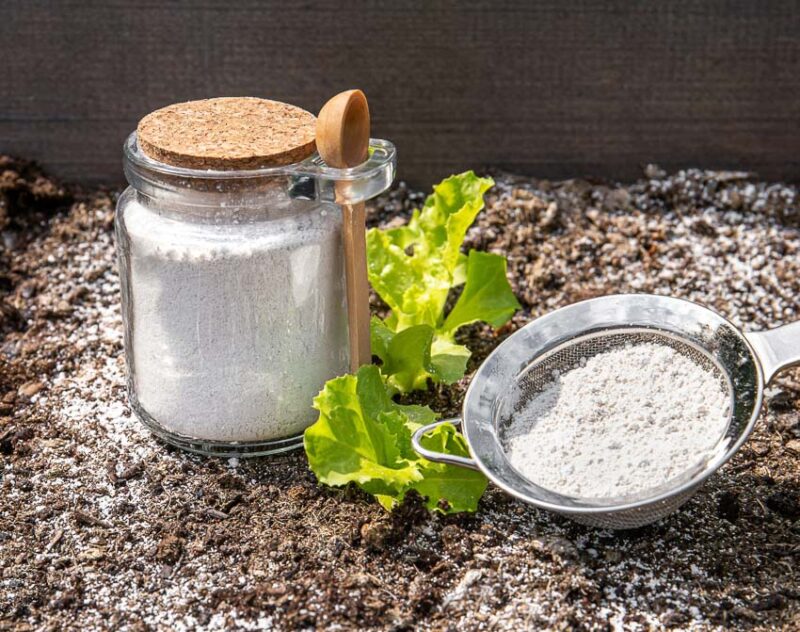
Diatomaceous earth is an excellent natural insecticide. It’s made of fossilized remains of tiny aquatic creatures that act like glass shards and cut into insects’ bodies and decimate them.
Sulfur is another natural repellent you can use if you don’t have pets on your lawn. Spread it at the rate of one pound per 500 square feet.
Mow Your Lawn Frequently
Tall grassy and brushy areas are hot spots for chigger activity. Avoid providing an optimal habitat for chiggers by keeping your lawn mowed, killing weeds, and avoiding overwatering during early summer months.
How to Get Rid of Chiggers in Your Home
Can chiggers live in your home? They may hitch a ride indoors on humans or pets, but you can use these tips to get rid of them.
Regular cleaning and vacuuming tips
During chigger season, it’s important to follow regular cleaning routines. Vacuum your carpets and clean your bedding regularly.
Natural repellents for indoor use
The best natural repellents for chiggers inside your home are apple cider vinegar and essential oils. The acetic acid in vinegar repels many pests, including mice, snakes, and insects like ants.
Essential oils are effective natural repellents that are safe to use indoors. Like vinegar, you can mix them with water and spray them around your home.
How to Get Rid of Chiggers in Mattresses & Furniture
Are you worried about chiggers in your mattresses and furniture? Here’s what to do.
Deep cleaning solutions and procedures
Deep cleaning of bedrooms in your house is the first step. Wash your bedding and use bleach mixtures on the baseboards and floors.
The best option is to use powdered sulfur on your mattresses. It’s also effective at repelling other arachnids and insects. Wear gloves and be careful not to breathe the dust when applying sulfur powder.
Protective covers and preventive measures
Protective covers for your pillows and mattresses make eliminating chiggers in your bed easier. Once you’ve treated your bed, removing and cleaning the covers regularly is much easier.
You can also spray your bed with an essential oil spray. Lavender is a welcoming scent for linens. It repels chiggers, and you can use it every day.
How to Get Rid of Chiggers on Your Body & Clothes
Find out what to do when exposed to chiggers and learn the best way to get them off your body and clothes.
Immediate post-exposure steps
Chiggers can’t live for more than a few hours on your clothes, but the best practice is to wash your clothes immediately with warm water. Then, dry them on high heat.
Showering and scrubbing your body with soap and water will get chiggers off your skin. Use a heavy lather of soap and concentrate on the affected areas.
Natural remedies and solutions for soothing bites
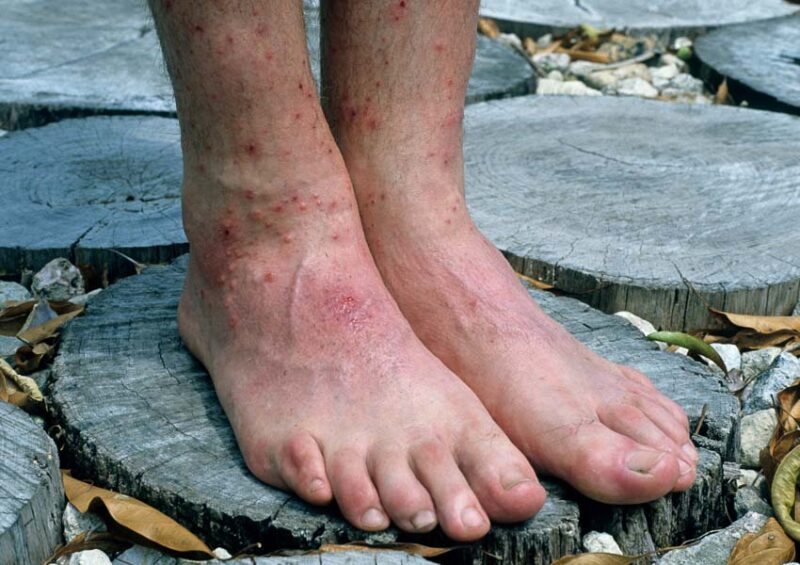
Once chiggers have bitten you, several natural remedies can soothe your skin. However, the bites may take a few weeks to heal, and you must reapply topical treatments frequently.
Use anti-itch creams and antiseptic ointments, such as hydrocortisone or calamine lotions. Furthermore, you can apply an ice pack to reduce swelling and provide relief. Analgesic and antihistamine medications are additional solutions.
How to Get Rid of Chiggers on Dogs
Your four-legged friends are also prone to chigger infestations. Learn what to do if your dog gets chiggers.
Natural pet-safe repellents
Spray your dog with natural pet-safe repellents during chigger season. Most dogs love to wander through tall grass where chiggers live, and it can be difficult to reduce their exposure potential.
Use caution when applying essential oil sprays to your dogs because they have sensitive noses. Some essential oils, such as peppermint oil, are poisonous to dogs. Cedarwood oil is safe for dogs and is one of the best natural repellents.
Further, regular grooming and cleaning routines will help ensure your dog isn’t carrying chiggers into your home.
How to Get Rid of Chiggers on Cats
Can chiggers infest cats that go in your yard? As a warm-blooded vertebrate, cats are just as susceptible to chiggers as dogs are.
Identifying and treating chigger infestations on felines
Not all cats experience adverse reactions to chiggers, but some will show similar symptoms as humans, including bumps and crusty bumpy skin.
Chiggers in cats is often accompanied by hair loss. Treatment should include cleaning, topical anti-itch medications, and antibiotics for secondary infections.
Safe preventative measures
If your feline is an indoor cat, spray it with a natural repellent before it goes outside. Cedarcide Original Bug Spray is safe for cats. Moreover, you can use it on their bedding to kill any chiggers they bring indoors.
How to Get Rid of Chiggers on Porches & Patios
During the warm summer months, chiggers turn up everywhere if you have an infestation. Here’s how to keep them off your porches and patios.
Cleaning routines and solutions
Sweep your front, back, and even screened-in porches and patio regularly during chigger season, then sprinkle diatomaceous earth over it. Use a Harris Earth Powder Duster to spread it evenly and efficiently.
Plants and herbs that deter chiggers
Chiggers live in vegetation, so keeping potted plants off your porch and patio will help reduce their numbers in these locations. To deter them, you can plant repellent plants like catnip, basil, marigolds, lavender, and chamomile around the perimeter.
How to Get Rid of Chiggers on Concrete Surfaces
Chiggers can go everywhere. You may even find them on concrete surfaces like your driveway and sidewalks. Instead of spraying them off into the lawn, learn how to get rid of chiggers so they won’t come back.
Effective cleaning agents and methods
Hosing down or pressure washing your concrete driveway and sidewalks rinses chiggers back onto the lawn. The best method to get rid of chiggers on concrete is to spray with Safer Insecticidal Soap and then lightly dust with diatomaceous earth once the area is dry.
Periodic maintenance tips
You don’t want to use harsh chemicals on concrete because they can damage the surface. Keep your driveway clean using Simple Green Concrete Driveway Cleaner .
How to Get Rid of Chiggers around Pools & Hot Tubs

Chiggers can’t survive in chlorinated water, so you may find dead chigger bodies floating around in your in-ground pool, and even above-ground pools, too. They’re naturally attracted to moist, wet areas, so how do you keep them away from your pools and hot tubs?
Proper pool maintenance and chemical balance
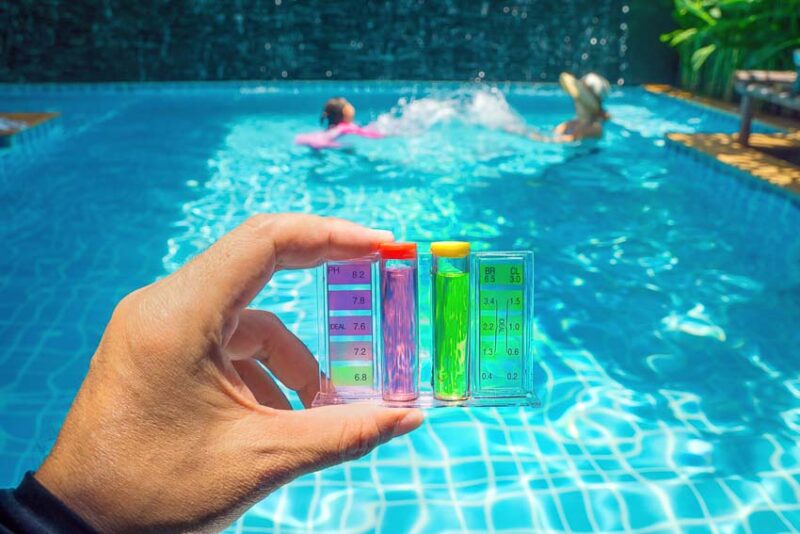
First, properly maintain your pools and hot tubs. A regular cleaning schedule is essential for a healthy pool, starting with the right chemical balance to keep the water safe for human use.
Surrounding area cleaning and landscaping tips
Try to keep the surrounding area as dry as possible. Mow the grass low, use plants that deter chiggers, and frequently spread diatomaceous earth throughout the grass and landscaping around your pool.
FAQs about Chiggers & How to Get Rid of Them
How can I differentiate between chigger bites and mosquito bites?
The location of the bites is the easiest way to differentiate between chigger and mosquito bites. Mosquitoes typically bite anywhere there’s exposed skin, while chiggers bite the ankles, behind the knees, and in the groin area.
Their bites are also different. Mosquito bites usually produce a swollen, itchy bump that is noticeable immediately, while chigger bites feel hard and scablike and start itching a few days after the initial bite.
Can chiggers infest my home like bed bugs?
Unlike bed bugs, which can live indoors, chiggers cannot survive in your home. Once chigger larvae attach to your body, they can stay there for a few days unless scrubbed off in the shower. Any that enter your home won’t survive more than a few hours once they fall off your body.
Are there any essential oils effective against chiggers?
The essential oils most effective against chiggers are peppermint, lavender, thyme, tea tree, and citronella. Peppermint and lavender are effective at getting rid of many pests, so it’s a good idea to purchase them in bulk and add them to homemade sprays.
How long do chiggers live on clothing and bedding?

While chiggers can feed on your body for a few days, they can’t last more than a few hours on your clothes or bedding. If you suspect they are on your bedding, washing your blankets and sheets in warm water and drying them on high heat will get rid of them.
Do chiggers spread diseases like ticks?
Just as ticks carry diseases, so do chiggers. Scrub typhus is a disease that infected chiggers can spread, but not in the United States. The most common regions for scrub typhus include Australia and parts of Asia.

